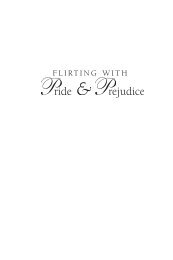Edited by Scott Westerfeld - Teen Libris
Edited by Scott Westerfeld - Teen Libris
Edited by Scott Westerfeld - Teen Libris
You also want an ePaper? Increase the reach of your titles
YUMPU automatically turns print PDFs into web optimized ePapers that Google loves.
Pants on Fire 13<br />
Lyra and Will learn to trust each other and to tell the truth, to reveal<br />
things they have kept secret from others. This honesty is essential for<br />
them to be able to unite their powers and save the world(s). Ultimately<br />
it’s that special human truth, the declaration of love, which enables them<br />
to do that.<br />
Finally, the power to read the truth is taken away from Lyra. She<br />
reaches puberty. She is no longer a child. The ability to follow the<br />
alethiometer’s swinging needle, to plumb the levels of meaning for the<br />
symbols, gradually slips away until she’s no wiser than anyone else as to<br />
its operation. Now if she wants to use it, she must do it the hard way.<br />
She must embark on years of study and memorize the many levels of<br />
meaning the symbols hold, or she must learn to recognize the truth herself,<br />
unaided.<br />
On her epic journey, Lyra learns the value of truth and the power of lies.<br />
She learns truths about herself-she’s loyal, she’s brave, and she’s capable<br />
of love. Lies have a place, Pullman tells us. But ultimately, it’s truth that is<br />
important, particularly inner truth, being truthful to yourself.<br />
“‘You must tell them true stories,’” a ghost tells Mary Malone, “‘and<br />
everything will be well’” (TAS 386). This is the truth for Philip Pullman.<br />
He has taken us on a long journey through lies to truth. For him,<br />
truth is everything. Stories are fiction, authors are a type of liar, but if<br />
the stories have that core of truth, then they’re a force for good even<br />
if they are a tissue of lies. He lies so that we, like Lyra, learn the value<br />
of truth.<br />
And there’s one particular truth that Pullman wants to leave us with.<br />
Being independent from any sort of “authority,” including God, is another<br />
kind of self-truth. “‘We’ve had nothing but lies and propaganda and<br />
cruelty and deceit for all the thousands of years of human history. It’s<br />
time we started again’” (TSK 282). He’s ready to throw out the concept<br />
of the Kingdom of Heaven and replace it with the Republic of Heaven,<br />
where everyone gets to think for themselves. We shouldn’t let God, or<br />
anyone’s idea of a god, or any representative of a god, tell us what is true<br />
and what is a lie.<br />
In the world of His Dark Materials, Dust particles know the truth, the<br />
universal truth, but in the end it’s just Philip Pullman’s truth, the only<br />
truth he knows. “Truth” isn’t something that can be captured or quantified.<br />
It isn’t fixed, nor is it universal. Truth has as many shades as lies do.



